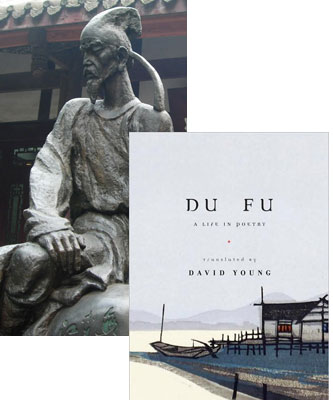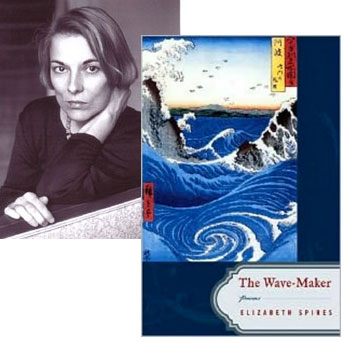Du Fu, “Remembering Li Bai on a Spring Day”

I know no poetry to equal his
his mind must be uniquefreshness of Yu Xin
Bao Zhao’s delicacyas I watch the trees leaf out
here, north of the Weihe’s probably gazing at sunset
there, east of the Yangziwhen can we share
a pot of wine againtalk on and on about poetry
until it’s nearly daybreak?
Du Fu: A Life in Poetry was translated by David Young and published in late 2008. Last week, Knopf posted Young’s translation of “A Summer Outing,” while Poetry Daily posted two more poems: “An Autumn Storm and Our Thatched Roof” and “Rain on a Spring Night.”
(Here are several Du Fu poems, but I’m afraid I don’t know who translated them. It certainly wasn’t Young; where Young’s “Autumn Thoughts” begins “Dew turns to jade-white ice / that scars and wilts the maple trees,” for example, the first line of this rendition of “Autumn Meditations” is “Jade dew withers and wounds the groves of maple trees.” I prefer the Young, myself.)
Li Bai was a contemporary of Du Fu, and the two are pretty much to Chinese poetry what Ted Williams and Joe DiMaggio were to mid-20th-century American baseball, if Williams and DiMaggio had only ever met twice in their lifetimes. Du Fu wrote at least a dozen poems we know of about how great Li Bai was; only one of Li Bai’s poems about Du Fu survives.
16 April 2009 | poetry |
Elizabeth Spires, “Grey Garden”

If, one morning, after many hints and premonitions,
you wake to a seasonless season, a grey garden
where nothing lives or dies because nothing
changes, and the only action left is inaction,
make a place for yourself among these fallen leaves.
Imagine a tree, once high and mighty, now felled
by catastrophe. How something is slowly breaking it down
until it crumbles at the merest touch, its form collapsing
inward. Its only hope, if hope is wise, to come back
as a speechless blade of grass, or one of those flowers
with bowed heads, a snowdrop pushing up through snow.
Time is a construct. You must not think about time.
Lie very still and do not mind the cold or count
the nights. You will know you are part of the scenery
when green shoots push up around your heart,
and small chattering birds make you their careless perch,
and even the insects have something to say
about your situation as they hum and whisper,
part of the earth, the earth, the earth,
and this grey garden comes back to life again.
The Wave-Maker, published in the summer of 2008, is the sixth collection of Elizabeth Spires’s poems. It also includes “The Snowy Day,” “Translation of My Life,” and “Moment Vanishing” (all of which Garrison Keillor read on his public radio show The Writers’ Almanac), and the delightfully compact “Bloated Haiku.
Older poems include “Grass” (from Beltway), “In heaven it is always autumn” (from The New Criterion), and Waving Goodbye” (from the Poetry Foundation website). Nine years ago, in an interview with Ploughshares, Spires reflected on where she was at in her writing career:
“I don’t think it’s some sort of phoenix-like redefinition for me… so much as a new stage or chapter that grows out of whatever was there before; there’s no part of a life that springs out of nothing. I am still just writing poems about what is directly in front of me that’s all-engrossing, trying to write really directly. I’ve never been prolific; for me poems are like major events. Even if they’re about something small—that something may seem small to other people, but it doesn’t feel small to me.”
Spires’ most recent poems were published earlier this year in I Heard God Talking to Me, where they are juxtaposed with photographs of the sculptures of William Edmondson.
15 April 2009 | poetry |

 Our Endless and Proper Work is my new book with Belt Publishing about starting (and sticking to) a productive writing practice.
Our Endless and Proper Work is my new book with Belt Publishing about starting (and sticking to) a productive writing practice. 
